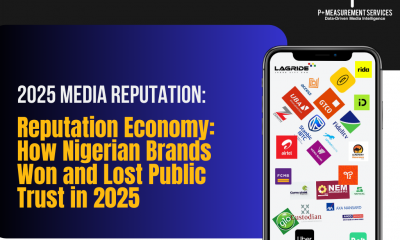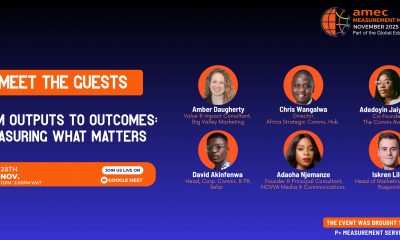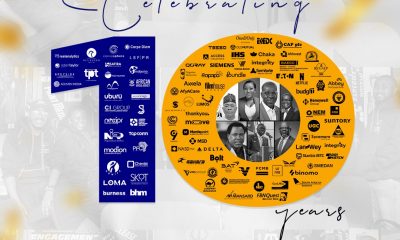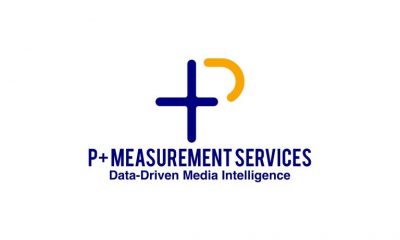Banking
Why It Is Unethical For PR Agencies To Mark Their Own Homework—Philip Odiakose


The first independent communications/PR measurement agency in Nigeria, P+ Measurement Services, recently set a new feat by becoming the first member of the International Association for Measurement and Evaluation of Communication (AMEC) in the country.
In a recent chat with BrandArena, Philip Odiakose, Lead Consultant of the firm, spoke on the benefit of being AMEC member and why it is unethical, unhealthy and unprofessional for PR agencies to mark their own homework. Excerpt:
Communications/PR measurement is very key to the growth of any business. How well is this practice in Nigeria?
I will begin by stating the meaning of AMEC, AMEC is the International “Association for Measurement and Evaluation of Communication”. The PR measurement practice is a budding industry in Nigeria. Brands are gradually warming up to the idea that value measurement is a core aspect of every marketing communications campaign. Benchmarking has become more important, PR measurement is gradually taking centre stage and definitely trend setting will complete the revolution for future performances of businesses and brands and we are glad that P+ is at the forefront of this evolution in the Nigerian business space.
In South Africa they have an Independent Association called SAMMA (South African Media Monitoring and Measurement Association) governing the Monitoring and Measurement consultant. There are no independent associations in Nigeria for the consultants in Nigeria, that is the reason PR agencies can take Independent monitoring briefs; which is unethical, unhealthy and unprofessional for an agency to mark their own homework. It is not right for you to be the accused, the judge and jury of your work”.
Can you expatiate more on that?
From my experience in the IMC industry, I can tell you that sometimes, agencies trim down on the negative report in order to look good in the eyes of the brand owners. Especially if the story is being published in one of the second tier publications that they feel doesn’t matter. That is why part of the service we also provide to our clients is crises management advisory. We understand the behaviour of the online media; we have monitored them and their feeders for a long time to know how to engage them when we want to.
As Lead Consultant at P+, how do you feel becoming the first member of AMEC in Nigeria?
We are excited to be the first member of AMEC in Nigeria. We are also happy to be the first Independent Communications/PR measurement agency in Nigeria. Our drive has been to improve the value proposition of brands so as to create an environment where brands can improve their services after reviewing the results of their campaigns. We want PR agencies to start seeing Independent Communications measurement agencies as partners (friends) rather than foes as our work helps to reflect the effectiveness of their activities.
We look forward to becoming a member of FIBEP, FIBEP is the world’s media intelligence federation with over 120 corporate members employing over 13,857 people in over 60 countries.
Due to the harsh economic situation of the country, many brand owners have been cutting cost on marketing communications, how has that affected P+?
The economic situation has affected brands no doubt, but we have been able to play a vital role in the growth of several brands even in this recession. A communications manager once said “if I had my last penny to choose between a PR agency and a PR measurement agency, I will choose a PR measurement agency, because I’m a communications person so I can still handle the PR for my brand, but I won’t want to take the risk of evaluating and measuring my own homework as I tend to be biased naturally”. We have proved through this period of recession that our consistent services are valuable to our clients by constantly providing them with access to information about their brands and supplementary information about the economic situation, so the effect on us has been minimal.
Tell us briefly about some of the things P+ has done so far this year?
As new entrants into the Nigerian market, we are proud of some of the work we’ve been able to do this year. We have provided PR measurement and media monitoring for clients locally and internationally across diverse industries ranging from financial institution, airlines, mobile technology, politics and government, tourism and resorts (South Africa), beverages and regional carnivals. It is evident that there is a market for P+’s services in the Nigerian business landscape as we have been able to build trust of multinationals, government and PR agencies in less than 2 years of our operation.
P+ has been one of the fastest growing agencies that offer PR measurement service in the country. Where do you see P+ in the next 5 years?
In the next five years, I see an industry where brands will put a stop to the practice of allowing PR agencies to handle their media monitoring and reportage, an industry where professionalism is paramount and one in which P+ is bringing in new innovations to help PR agencies and communications managers implement the new public relations measurement standard of the industry.
Lastly, what are your thoughts about the future of Communication/PR measurement generally? And what does being a member of AMEC mean for P+ as a young agency?
AMEC membership is internationally representative, with members in over 48 different countries, providing an opportunity to network and do business across borders which P+ happens to be the only member in Nigeria currently.
I have always said that measurements and evaluations are destined for top management capacities; from the creative strategy sessions and the processes of determining results. The future of the measurement industry is an industry where measurement consultants are called in during the planning phase to help determine a scope for how to measure results of their campaigns on all platforms from the start.
We are gradually leading the evolution by monitoring 26 print publications daily and 71 print publications in total within Lagos, part of the south, east and west; knowing full well that it is impossible to do selective monitoring and provide a competitive analysis report for brands. Timeliness stand us out in the industry, as our daily report gets to clients as early as 5am around the clock (first of its kind in Nigeria), every communication/PR directors and managers want to see their daily media highlights when they are still on the bed or on their way to work; that’s what P+ provide.
We received testimonies from clients, that “our timely daily report has helped them to make quick management decisions”. P+ is a believer of the human analysis report as against machine generated reports, we currently subscribe to 3 online media monitoring tools for near real time monitoring for our clients, but we do not allow the tools to generate reports for us because when measurement is built into a news monitoring platform the general metrics used can be a horrible reflection of your actual impact, Studies have revealed that automated measurement can be, at best, 55% accurate at times. So here you have to ask yourself, can I afford to be wrong almost half the time?

Banking
Public Offer: Sterling Holdco Allots 13.812 billion Shares to 18,276 Shareholders

By Aduragbemi Omiyale
Sterling Financial Holdings Company Plc has allotted shares from its public offer of 2025 to investors with valid applications.
The allotment follows the earlier receipt of final approval from the Central Bank of Nigeria (CBN) and the recent clearance by the Securities and Exchange Commission (SEC).
In September 2025, the financial institution offered for sale about 12,581,000,000 ordinary shares of 50 kobo each at N7.00 per share in public offer.
However, the exercise received wide participation from the investing public, with the company getting 18,280 applications for 16,839,524,401 ordinary shares valued at approximately N117.88 billion.
Following a thorough verification process, valid applications were received from 18,276 shareholders for a total of 13,812,239,000 ordinary shares, representing a subscription level of 109.79 per cent and reflecting sustained confidence in Sterling Holdco’s strategic direction, governance, and long-term growth prospects.
The firm approached the capital market for additional funds for the recapitalisation of its two flagship subsidiaries, Sterling Bank and The Alternative Bank.
The capital injection will support the commencement of full operations and contribute to the group’s revenue diversification objectives.
In line with the guidelines set out in the offer prospectus, Sterling Holdco confirmed that all valid applications will be allotted in full. Every investor who complied with the terms of the offer will receive all the shares for which they applied.
A very small number of applications were not processed or were partially rejected due to non-compliance with the offer terms, including duplicate payments and failure to meet the minimum subscription requirement of 1,000 units or its multiples, as stipulated in the offer documents.
The group ensures a seamless post-offer process, with refunds for excess or rejected applications, along with applicable interest, to be remitted via Real Time Gross Settlement or NIBSS Electronic Funds Transfer directly to the bank accounts detailed in the application forms.
Simultaneously, the electronic allotment of shares has be credited to successful shareholders’ accounts with the Central Securities Clearing System (CSCS) on February 17, and for applicants who do not currently have CSCS accounts, their allotted shares will be temporarily held in a registrar-managed pool account pending the submission of their completed account opening documentation to Pace Registrars Limited, after which the shares will be transferred to their personal CSCS accounts.
Banking
CBN Governor Seeks Coordinated Digital Payment Reforms

By Modupe Gbadeyanka
To drive inclusive growth, strengthen financial stability, and deepen global financial integration across developing economies, there must be coordinated reforms in digital cross-border payments.
This was the submission of the Governor of the Central Bank of Nigeria (CBN), Mr Olayemi Cardoso, at the G‑24 Technical Group Meetings in Abuja on Thursday, February 19, 2026.
According to him, high remittance costs, settlement delays, fragmented systems, and heavy compliance burdens still limit the participation of households and Micro, Small and Medium Enterprises (MSMEs) in global trade.
The central banker emphasised that efficient payment systems are essential for economic inclusion, highlighting that global remittance corridors still incur average costs above 6 per cent, with settlement delays of several days, excluding millions from modern economic activity.
Mr Cardoso cautioned that while digital payments present significant opportunities, they also carry risks such as currency substitution, weakened monetary transmission, increased FX volatility, capital-flow pressures, and regulatory fragmentation.
The G-24 TGM 2026, themed Mobilising finance for sustainable, inclusive, and job-rich transformation, convened global financial stakeholders to advance the modernisation of finance in support of emerging and developing economies.
The CBN chief reaffirmed Nigeria’s commitment to working with G-24 members, the IMF, the World Bank Group, and other partners to build a more inclusive, resilient, and development-oriented global financial architecture.
“We have strengthened our AML/CFT frameworks in line with FATF guidelines, requiring strict dual-screening of cross-border transactions to mitigate risks.
“To deepen regional integration, the CBN introduced simplified KYC/AML requirements for low-value cross-border transactions to encourage broader participation in PAPSS, easing processes for Nigerian SMEs and enabling faster intra-African trade payments.
“We have also embraced fintech innovation through our Regulatory Sandbox, allowing payment-focused fintechs to test secure, instant cross-border solutions under close CBN supervision,” he disclosed.

Banking
Unity Bank, Providus Bank Merger Awaits Final Court Approval

By Modupe Gbadeyanka
The merger and business combination between Unity Bank Plc and Providus Bank Limited remains firmly on course, a statement from one of the parties disclosed.
According to Unity Bank, there is no iota of truth in reports in certain sections of the media suggesting that the merger process had stalled, as the transaction remains firmly on track.
It was disclosed that the necessary regulatory steps have been completed, but only a few other steps to finalise the transaction, especially the final court sanction.
There had been speculations that both lenders may not meet the new minimum capital requirement of the Central Bank of Nigeria (CBN) before the March 31, 2026, deadline.
However, it was noted that the combined capital base of Unity Bank and Providus Bank exceeds N200 billion, which is the minimum requirement to retain a national banking licence under the CBN’s recapitalisation framework.
When completed, the Unity-Providus merger is expected to deliver a stronger, more competitive, and customer-centric financial institution — one with the scale, innovation, and reach to redefine the retail and SME banking landscape in Nigeria.
“The merger with Providus Bank significantly enhances our capital base, operational capacity, and strategic positioning.
“We are confident that the combined institution will be better equipped to support economic growth and deliver innovative financial solutions across Nigeria,” the chief executive of Unity Bank, Mr Ebenezer Kolawole, stated.
Recall that a few months ago, shareholders authorised the merger between the two entities at Court-Ordered Meetings. They also adopted the scheme of merger at their respective Extraordinary General Meetings (EGMs) in September 2025,
The central bank also backed the merger, with a pivotal financial accommodation to support the transaction. The merger also received a further boost with a “no objection” nod from the Securities and Exchange Commission (SEC).
The regulatory approvals form part of broader efforts to strengthen the resilience of Nigeria’s banking system, reinforce capital adequacy across the sector, and mitigate potential systemic risks.
The development positions the combined entity among the 21 banks that have satisfied the apex bank’s new capital threshold for national banking operations.
-

 Feature/OPED6 years ago
Feature/OPED6 years agoDavos was Different this year
-
Travel/Tourism10 years ago
Lagos Seals Western Lodge Hotel In Ikorodu
-

 Showbiz3 years ago
Showbiz3 years agoEstranged Lover Releases Videos of Empress Njamah Bathing
-

 Banking8 years ago
Banking8 years agoSort Codes of GTBank Branches in Nigeria
-

 Economy3 years ago
Economy3 years agoSubsidy Removal: CNG at N130 Per Litre Cheaper Than Petrol—IPMAN
-

 Banking3 years ago
Banking3 years agoSort Codes of UBA Branches in Nigeria
-

 Banking3 years ago
Banking3 years agoFirst Bank Announces Planned Downtime
-

 Sports3 years ago
Sports3 years agoHighest Paid Nigerian Footballer – How Much Do Nigerian Footballers Earn























